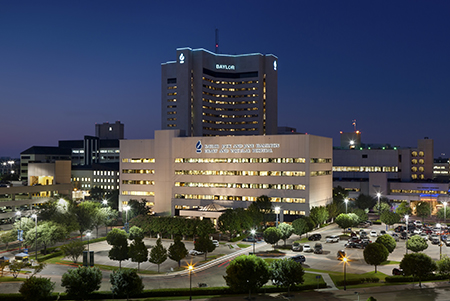
A new implantable cardiac device the size of a quarter is offering some patients an alternative to long-term blood thinner use to reduce the risk of stroke.
The approach was first tested in clinical trials in 2010 through 2013 at Baylor Jack and Jane Hamilton Heart and Vascular Hospital. Now physicians on the medical staff are early adopters of the technology they helped assess during clinical trials.
This FDA-approved implantable device gives patients with atrial fibrillation, or an irregular heartbeat, an alternative to taking blood thinners. These patients take blood thinners to reduce the risk of a stroke caused by clots forming in the heart chambers, particularly the left atrial appendage (LAA), located on the top of the heart.
The WATCHMAN TM Left Atrial Appendage Closure (LAAC) is designed to prevent blood clots that frequently form in the LAA from traveling in the blood stream to the brain, lungs and other parts of the body. Clots that travel to the brain cause strokes, one of the leading causes of death and disability.
"Our greatest worry with patients who have atrial fibrillation is that they will have a stroke," said Kevin Wheelan, M.D., chief-of-staff at Baylor Hamilton Heart and Vascular Hospital and co-medical director of cardiology. "Research has shown that patients with this type of heart arrhythmia are five times more likely to have a stroke. Blood thinners have been the standard course of treatment, but, for some patients, an alternative such as this device is a better long-term approach."
The parachute-shaped WATCHMAN TM device is implanted using minimally invasive techniques. Cardiologists perform the hour-long procedure in a catheterization lab while the patient is under light general anesthesia. Generally patients are released from the hospital in less than 24-hours after the procedure and gradually decrease their use of blood thinner medication over time, under supervision of their cardiologist.
Research at Baylor Hamilton Heart and Vascular Hospital
Staying abreast of new technology and diagnostic as well as treatment options for patients is a high priority at Baylor Hamilton Heart and Vascular Hospital. The clinical team's goal is to develop and be involved in advanced research that will allow patients to participate in and benefit from innovative heart and vascular discoveries. Research is the backbone and first step in defining patient care. The 75-plus trials currently running are investigating many areas, including an anticoagulant that does not require INR bloodwork, genes and angina, atrial fibrillation, and stenting of the left main coronary artery. The WATCHMAN TM device, developed by Boston Scientific received FDA approval in March 2015.
Physicians provide clinical services as members of the medical staff at one of Baylor Scott & White Health's subsidiary, community or affiliated medical centers and do not provide clinical services as employees or agents of those medical centers, Baylor Health Care System, Scott & White Healthcare or Baylor Scott & White Health.
# # #
MEDIA CONTACT:
Susan Hall
Susan.Hall@BSWHealth.org
214-820-1817
About Baylor Scott & White Health
As the largest not-for-profit health system in the state of Texas, Baylor Scott & White promotes the health and well-being of every individual, family and community it serves. It is committed to making quality care more accessible, convenient and affordable through its integrated delivery network, which includes the Baylor Scott & White Health Plan, Baylor Scott & White Research Institute, the Baylor Scott & White Quality Alliance and its leading digital health platform – MyBSWHealth. Through 51 hospitals and more than 1,200 access points, including flagship academic medical centers in Dallas, Fort Worth and Temple, the system offers the full continuum of care, from primary to award-winning specialty care. Founded as a Christian ministry of healing more than a century ago, Baylor Scott & White today serves more than three million Texans. For more information, visit: BSWHealth.com
